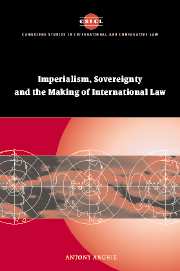Book contents
- Frontmatter
- Contents
- Foreword
- Acknowledgements
- Table of cases
- Table of treaties
- Introduction
- 1 Francisco de Vitoria and the colonial origins of international law
- 2 Finding the peripheries: colonialism in nineteenth-century international law
- 3 Colonialism and the birth of international institutions: the Mandate System of the League of Nations
- 4 Sovereignty and the post-colonial state
- 5 Governance and globalization, civilization and commerce
- 6 On making war on the terrorist: imperialism as self-defence
- Conclusion
- Bibliography
- Index
- CAMBRIDGE STUDIES IN INTERNATIONAL AND COMPARATIVE LAW
5 - Governance and globalization, civilization and commerce
Published online by Cambridge University Press: 05 August 2012
- Frontmatter
- Contents
- Foreword
- Acknowledgements
- Table of cases
- Table of treaties
- Introduction
- 1 Francisco de Vitoria and the colonial origins of international law
- 2 Finding the peripheries: colonialism in nineteenth-century international law
- 3 Colonialism and the birth of international institutions: the Mandate System of the League of Nations
- 4 Sovereignty and the post-colonial state
- 5 Governance and globalization, civilization and commerce
- 6 On making war on the terrorist: imperialism as self-defence
- Conclusion
- Bibliography
- Index
- CAMBRIDGE STUDIES IN INTERNATIONAL AND COMPARATIVE LAW
Summary
Introduction
Few of the NIEO initiatives had an enduring impact on international law and the international economic system. Rather, through the 1980s, neo-conservative economic and development policy became the norm, and the collapse of the Berlin Wall and the end of the Cold War were taken to signal the ultimate triumph of capitalism and its decisive emergence as the one economic system that every society had to follow if it was to prosper and progress. Following this, ‘globalization’ became one of the dominant themes of the 1990s. While the term ‘globalization’ is the subject of intense discussion and debate, and globalization has had an impact on virtually every aspect of life – cultural, political and social – I use the term here to refer principally to an economic phenomenon, the internationalization of production and financial services. For the Third World, more specifically, globalization has signified the dominance of neo-liberal economic policies, the ‘Washington Consensus’, promoting privatization and liberalization; these policies have been forcefully advanced by the three major international economic institutions, the World Trade Organization (WTO), the World Bank (hereafter, ‘the Bank’) and the International Monetary Fund (IMF).
The relationship between globalization and imperialism has been the subject of considerable scholarship. Globalization, for Michael Hardt and Antonio Negri, has created a particular global order ‘a new logic and structure of rule – in short, a new form of sovereignty’, a sovereignty which they call ‘Empire’, an Empire which, while it resembles old empires in various ways, is significantly novel in part because of its all encompassing character: ‘Empire's rule has no limits.’
- Type
- Chapter
- Information
- Imperialism, Sovereignty and the Making of International Law , pp. 245 - 272Publisher: Cambridge University PressPrint publication year: 2005

